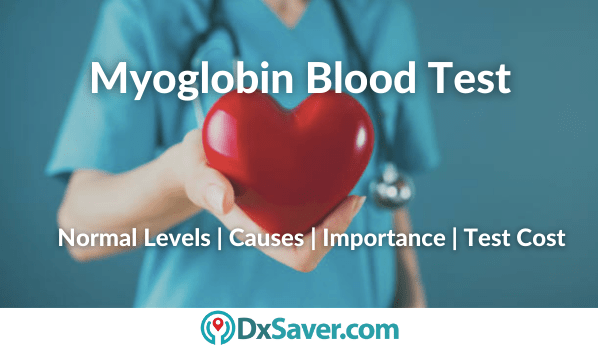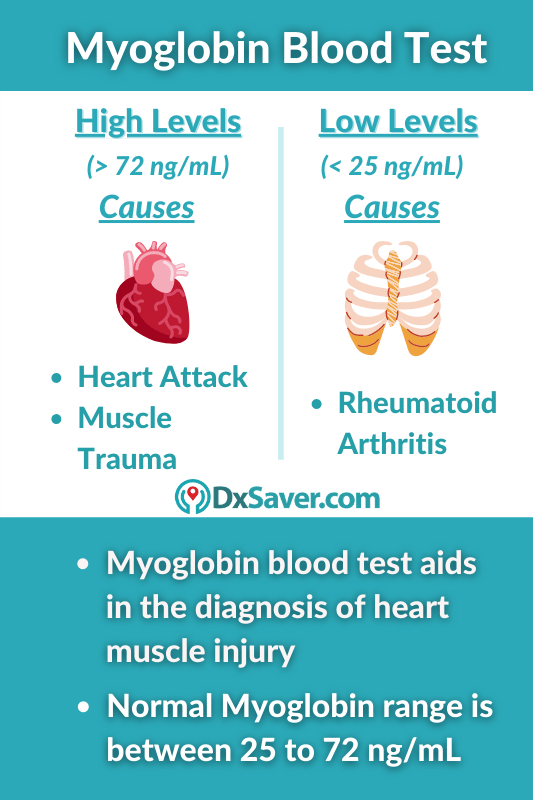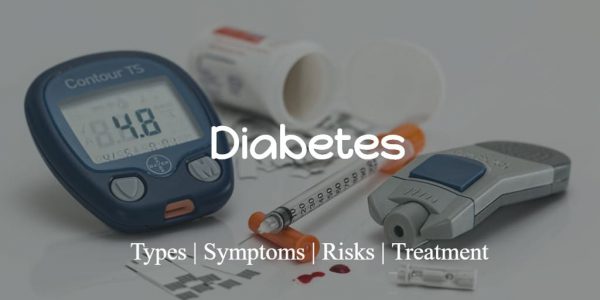
Myoglobin is protein content, similar to hemoglobin that has a primary job of storing oxygen in blood cells. Myoglobin is found in muscles. If you have any muscle damage or injury, your myoglobin levels in the blood tend to elevate.
High myoglobin levels are also seen in medical conditions such as heart attacks, seizures, muscular dystrophy, trauma, surgery, and myositis (inflammation of the muscles). In this blog, we explain all the significant topics asked on Myoglobin in detail.
- Myoglobin Blood Test Cost
- What is Myoglobin?
- What is Myoglobin in blood & why is it important?
- Myoglobin vs. Hemoglobin
- How is the Myoglobin blood test performed?
- Is there any preparation required before the Test?
- Are there any risks in the Myoglobin blood test?
- Myoglobin normal levels
- High Myoglobin blood test levels
- Low Myoglobin blood test levels
- Providers Locations
For our readers, who are very much interested in knowing the Myoglobin Blood test cost beforehand, we would like to begin with that section.
Myoglobin Blood Test Cost
The cost of the Myoglobin blood test ranges around $83 in labs and facilities across the U.S. No prior appointment is required. Compare the price, order your test online and visit the nearest lab during lab business hours. Complete the procedure and get the results in your email in 2 to 3 business days. Doctor consultation is also available for further treatment or for any kind of medical advice.
The following table shows the Myoglobin blood test cost at one of our partner laboratories (CLIA – Certified) network located across the U.S.
Name of our Partner Labs | Book Online |
Personal Testing Labs
| Offer Price$83 |
Cost of Myoglobin blood test cost with insurance
Many health insurance policies in the U.S. do not cover the cost of the Myoglobin blood test. Also, the coverage offered by private health insurance policies and national health insurance programs varies widely. So we recommend you to check with your insurance company.
Our Myoglobin blood testing providers do not accept any health insurance. But, on request, they can provide you with a receipt containing all the details like the name and code of the test, and CPT code which is necessary for insurance reimbursement purposes.
What is Myoglobin?
Myoglobin is found in the heart and skeletal muscles. When you workout, your muscles will get tired and needs oxygen for proper functioning without any muscle tear or cramp. Myoglobin carries oxygen along with it just like hemoglobin in the RBCs, and myoglobin provides extra oxygen for your muscles to withstand the high endurance physical activities.
If your muscle has been injured, the myoglobin stored in the blood is opened up to flow into the bloodstream. Thus, your blood test or urine test (kidneys will eliminate the excess myoglobin circulating) contains high levels of myoglobin indicating a muscle damage and other similar medical conditions. The levels can abruptly rise that your excess content can be detected within a few hours of muscle injury and enabling a quick medical diagnosis.
What is Myoglobin in blood & why is it important?
Apart from a regular muscle injury, a myoglobin blood test is also prescribed to monitor heart health or to detect any heart attack/heart muscle injury.
Myoglobin is a protein substance that helps in warehousing the oxygen in your muscles. They start to leak out when you have an injury. Soon after 1 – 3 hours of a heart attack the myoglobin will stand at abnormal levels and reach the highest values within 8-12 hours past injury. Myoglobin is requested if you have/had any chest pain and have a vulnerability to face a heart attack, to be more precise when your ECG electrocardiogram doesn’t show a clear picture. That is your ECG records your heart rhythm as your heart muscle beats, but when you have or had any heart attack the rhythm changes.
Myoglobin in your blood shows high levels when you had a recent heart muscle or other muscle tissue injury.
When do you need a Myoglobin blood test?
Typically, this test is ordered to diagnose muscle injury and related medical conditions. You may experience the following symptoms if you have a muscle injury –
- Belly pain
- Dark-colored urine
- Fever
- Fatigue
- Muscle pain
- Nausea and vomiting
Myoglobin Vs. Hemoglobin
Both hemoglobin and myoglobin are similar in the theoretical aspect but differs in the technical aspect. Both have the primary job of carrying/transporting oxygen. However, they are completely different if the method of delivering oxygen is taken into consideration. The following table shows the main two differences between hemoglobin and myoglobin –
Hemoglobin | Myoglobin |
| Hemoglobin is a heterotetrameri protein – found in red blood cells (erythrocytes) | Myoglobin is a monomeric protein – found mainly in muscle tissue |
| Promotes diffusion of Oxygen throughout the body (binds O2 at lungs, releases at tissues) | Promotes diffusion of Oxygen into and throughout muscle cell |
Here is an in-depth resource on how myoglobin differs from hemoglobin.

How is the Myoglobin blood test performed?
As the name suggests, the Myoglobin blood test is a simple blood test. During this test, a lab technician or a phlebotomist will cleanse the skin with an antiseptic and place an elastic band around the upper arm so that the vein becomes visible and swells with blood. He/she then injects a needle and draws a sample of blood in a test tube. After the blood is drawn, he covers the injected area with a band-aid to stop bleeding. The typical blood specimen is then sent to the lab for analysis.
It takes less than 10 minutes to perform this test.
Is there any preparation required before the test?
There are no special preparations required before the test. You can continue to have regular food plans and usual daily activities.
Are there any risks in the Myoglobin blood test?
There is no possible risk or complication in taking the Myoglobin blood test. You might have slight pain or bruise in the injected area for a very little period.
Myoglobin normal levels
Generally, a healthy and normal myoglobin level should stand anywhere between 25 to 72 ng/mL (1.28 to 3.67 nmol/L). However, the normal myoglobin levels may slightly varies between lab to lab.
High Myoglobin blood test levels
If your myoglobin blood test shows more than 72 ng/mL, then it indicates that there has been a very recent injury to muscle tissue. Some examples of causes of increased levels include
An increased level of myoglobin may be due to:
- Accidents that result in muscle trauma
- Any muscle disease, such as muscular dystrophy
- Heart attack
- Malignant hyperthermia (very rare)
- A disorder that causes muscle weakness and loss of muscle tissue
- Skeletal muscle inflammation
- Skeletal muscle ischemia (oxygen deficiency)
- Skeletal muscle trauma
- Seizures
- Surgery
A significantly elevated level of myoglobin may be caused by rhabdomyolysis which can be a result of consuming the following drugs at overdose levels –
- Alcohol (ethanol), heroin, and cocaine
- Antibiotics (amphotericin B, ampicillin)
- Anesthetics
- Antidepressants
- Antihistamines
- Aspirin (salicylates)
- Corticosteroids
- Lidocaine
- Lithium
- Statins (used to treat high cholesterol)
- Theophylline
Low Myoglobin blood test levels
Low myoglobin levels are very rare, however, if your myoglobin blood test shows less than 25 ng/mL then you might be affected by one of the following health conditions –
Rheumatoid arthritis
Myasthenia gravis
Antibodies to myoglobin in your blood
Providers Locations
The Myoglobin blood test can be done in any of the following locations across the U.S. by visiting the nearest lab. To know the Myoglobin blood test cost, refer to the first section of the article.
- Alabama
- Arizona
- Arkansas
- California
- Colorado
- Connecticut
- Delaware
- Florida
- Hawaii
- Georgia
- Idaho
- Illinois
- Indiana
- Iowa
- Kansas
- Kentucky
- Louisiana
- Maine
- Michigan
- Minnesota
- Mississippi
- Missouri
- Montana
- Nebraska
- Nevada
- New Hampshire
- New Mexico
- North Carolina
- North Dakota
- Oklahoma
- Oregon
- Pennsylvania
- Puerto Rico
- South Carolina
- South Dakota
- Tennessee
- Texas
- Utah
- Vermont
- Virginia
- Washington
- West Virginia
- Wisconsin
- Wyoming
Frequently Asked Questions
Will insurance cover my testing cost?
No, insurance will not be covered in the billing. However, they will provide you a receipt for insurance reimbursement purposes.
How should I book my appointment?
You can choose the most suitable provider from above and make an appointment by following the instructions mentioned by them.
Can I cancel my lab test order?
Yes, you can cancel your lab test order anytime before your testing. A refund will be initiated after deducting the cancellation fee. However, cancellation is at the discretion of the provider.
Do the providers offer result interpretations?
Yes, a few providers may provide doctor consultation who will take you through the results and provide clarification if needed.
How do I receive my report?
To ensure your privacy, the test report will be mailed to you by the provider.
Other topics you may be interested in:-
- What is Homocysteine & why is it Important to Heart Health?
- Heavy Metal Toxicity Symptoms & Diagnosis
- AFP Test Cost in the US
- Is Itching a Symptom of STD?
- Signs and Symptoms of Oral Syphilis
- Importance of C-Reactive Protein, CRP Levels in Blood
- Cervical Cancer Symptoms & Treatment
- Thyroid Stimulating Hormone, TSH Test Cost in the US
- Normal Vitamin B-12 Levels & Causes of Low/High Vitamin B-12 Levels
- HIV RNA Test Accuracy and Test Cost Near You
- H Pylori Infection Causes, Symptoms & Diagnosis
- C-Peptide Normal Levels, Test Results & Treatment
- What is RDW in your CBC Blood Test?
- Types of STDs that cannot be cured
- Types of STDs That Cause Mouth Sores Symptoms in Men and Women
- Herpes Vs. HPV: Differences, Symptoms, and Testing Cost
- Oral STDs: Names, Symptoms, Treatment and Testing Cost






